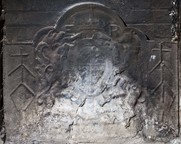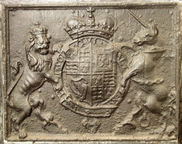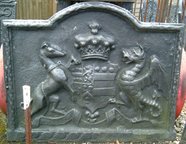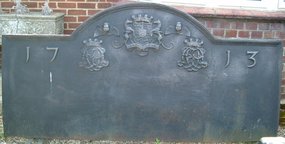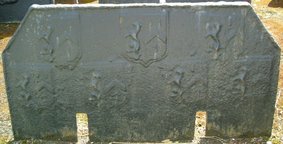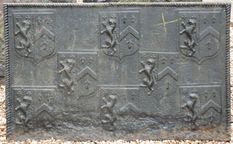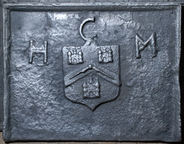-
1248
Description: Central arched rectangular shape with rounded corners; ovolo moulding all round; oval Tudor royal shield with garter surrounding, topped with a royal crown; dragon and greyhound supporters; initials split by crown; all details below shield illegible; rectangular extension panels on each side, with twisted rope edging; quasi mirrored arrangement of twisted rope lengths to form (from the top) a cross, a vertical pointing arrow, and a diamond shape with a central vertical line.
Notes: The detail of the extension panel is sharper than the armorial, indicating that the panel was cast with a worn copy of the armorial. Illustrated in Weaver, 1914, p. 16.
Inscription: E R [+ Garter, Harvo and royal mottoes, all illegible]
Arms: Tudor royal (prob. Henry VIII)
- Decoration tags:
- rectangular with round arch (shape)
- rope and ovolo moulding (edging)
- simple stamps
- whole carved pattern
- extension panels
- heraldic
- apotropaic
- armorial
- royal
- text
- objects
Manufactured: in the late-16th to early-17th century in the Weald area of England.
Current location: in private hands, Plaistow, West Sussex, England.
Citation: Weaver, L., 1914, Small Country Houses: their repair and enlargement (London, Country Life).
- Attached to series:
- Pounsley series
- John Harvo series
- Tudor royal armorial firebacks
-
1191
Description: Rectangular; twisted rope edging (top and sides only); eight shields of Ayloffe impaling Sulyard in three rows, 3-2-3; Ayloffe: sable, a lion rampant Or, collared gules, between three crosses formy of the second; Sulyard: argent, a chevron gules between three pheons inverted sable.
Notes: William Ayloffe (c1535-1584) of Bretons, Hornchurch, Essex, Justice of the Court of Queen’s Bench, married (c1560) Jane, dau. of Sir Eustace Sulyard, of Runwell, Essex. Illustrated in Lloyd (1925).
Arms: Ayloffe impaling Sulyard (William Ayloffe of Bretons, Hornchurch)
- Decoration tags:
- rectangular (shape)
- rope (edging)
- carved stamps
- heraldic
- armorial
Manufactured: in the early-17th century in the Weald area of England.
Current location: not known.
Citation: Lloyd, N., 1925, 'Domestic Ironwork I', Architectural Review, 58, pp. 58-67.
- Attached to series:
- Ayloffe series
- Personal armorial firebacks
-
593
Description: Rectangular, cavetto moulded edging; Stuart royal shield, garter, supporters and crown.
Notes: Four clear vertical plank lines indicate that the pattern for this fireback was formed of a series of boards probably secured by horizontal battens on the rear.
Copies of this fireback are known.
Inscription: HONI SOIT QVI MAL Y PENSE
Arms: English Stuart royal
- Decoration tags:
- rectangular (shape)
- cavetto (edging)
- whole carved pattern
- planklines
- armorial
- royal
- text
Manufactured: in the late-17th century in England.
Current location: Ham House, Richmond, Surrey, England.
Museum number: 1140118 (part of the National Trust museum group)
- Attached to series:
- Stuart royal armorial firebacks
-
596
Description: Arched rectangular shape with base plinth; astragal and fillet edging (top and sides) with overlapping leaf pattern; mirrored wave pattern on plinth; shield, supporters, motto scroll and coronet of the 1st Earl of Ashburnham.
Notes: The arms are Ashburnham impaling Grey: Ashburnham: quarterly 1. Ashburnham - gules a fess between six mullets argent; 2. Holland - azure semee of fleurs-de-lys a lion rampant guardant argent; 3. Kenn - ermine three crescents gules; 4. Vaughan - sable a fess argent between three boys' heads couped at the shoulders proper having snakes enwrapped about their necks vert; and Grey - barry of six argent and azure in chief three torteaux. John, 3rd Baron Ashburnham, married Lady Jemima Grey in 1724. He was created Earl of Ashburnham in 1730 so the fireback probably dates between then and 1731 when Lady Ashburnham died. A sketch of an example of this fireback was made by J. Starkie Gardner c.1891 and is in his collection at the Victoria and Albert Museum, Archive of Art and Design (AAD/2014/8).
Copies of this fireback are known.
Inscription: LE ROY ET L'ESTAT [barely legible]
Arms: John, 1st Earl of Ashburnham
- Decoration tags:
- rectangular with round arch (shape)
- astragal & fillet (edging)
- whole carved pattern
- armorial
Manufactured: in the early-18th century probably at Ashburnham Furnace in the Weald area of England.
Current location: Mark Ripley Forge & Fireplaces, Northbridge Street, Robertsbridge, East Sussex, England.
Citation: Denny, H., 1937, 'Iron Fire-back', Sussex Notes and Queries, 6, 6, p. 189.
- Attached to series:
- Ashburnham family firebacks
- Personal armorial firebacks
-
597
Description: Arched rectangular; ovolo edging (top and sides only); arms of the Barony of Ashburnham: (1st & 4th) gu. a fess between six mullets ar. (Ashburnham), (2nd) az. a lion rampant between eight fleurs de lys ar. (Holland), (3rd) erm. three crescents gu. (Kenn); on an escutcheon of pretence a chevron between three boys heads couped at the shoulders each entwined around the neck with a snake (Vaughan). Supporters: two greyhounds sa. their faces, breasts, and feet ar. collared and lined or; on either side of the arms is a winged cherub’s head; below each is a monogram of ‘B J’ beneath a baron’s coronet.
Notes: The arms are those of John, 1st Baron Ashburnham (1656-1710), who married Bridget Vaughan, but the fireback dates from the time of his son, John, the 3rd Baron, created Earl in 1730.
Copies of this fireback are known.
Inscription: LE ROY ET L’ESTAT / 17 13
Arms: John, 1st Baron Ashburnham
- Decoration tags:
- rectangular with round arch (shape)
- ovolo (edging)
- carved stamps
- individual numbers
- heraldic
- armorial
- text
- humans
Manufactured: in 1713 probably at Ashburnham Furnace in the Weald area of England.
Current location: Mark Ripley Forge & Fireplaces, Northbridge Street, Robertsbridge, East Sussex, England.
- Attached to series:
- Ashburnham family firebacks
- Personal armorial firebacks
-
599
Description: Canted rectangle; ovolo moulded edging (top and sides); seven shields of Ayloffe impaling Sulyard - two rows with three on top and four on the bottom; two parallel vertical cuts for the insertion of firedogs.
Notes: Ayloffe: sable, a lion rampant Or, collared gules, between three crosses formy of the second; Sulyard: argent, a chevron gules between three pheons inverted sable. William Ayloffe (c1535-1584) of Bretons, Hornchurch, Essex, Justice of the Court of Queen’s Bench, married (c1560) Jane, dau. of Sir Eustace Sulyard, of Runwell, Essex. There is a large number of variants using the same shields.
Arms: Ayloffe impaling Sulyard (William Ayloffe of Bretons, Hornchurch)
- Decoration tags:
- rectangular with canted top corners (shape)
- rope (edging)
- carved stamps
- armorial
Manufactured: in the early-17th century in the Weald area of England.
Current location: Mark Ripley Forge & Fireplaces, Northbridge Street, Robertsbridge, East Sussex, England.
- Attached to series:
- Ayloffe series
- Personal armorial firebacks
- Andiron slot firebacks
-
604
Description: Arched rectangular with curved shoulders; cavetto-moulded edging (top and sides) with twin scrolls on inside corners, and scalloped bottom edge; armorial; shield (32 quarters), mantling, supporters (bull and crowned lion), coronet, motto, 2 helms and crests (a bear’s head erased and ducally gorged, and a bear and ragged staff).
Notes: The impaled arms appear to be those of the Earldom of Huntingdon. The crests are of Hastings and Dudley, suggesting they are of Henry, 3rd Earl (c.1535-95), and his wife, Katherine (1548-1620), daughter of John Dudley, Duke of Northumberland. She was a child when they married in 1553. This is an incomplete casting, the full version of which includes a bottom panel with a repeated guilloche design. Christie's Masters and Makers Sale, South Kensington, 30 Nov 2010, lot 516 (£4,375).
Copies of this fireback are known.
Inscription: IN VERITATE VICTORIA (illegible, but verified on other castings)
Arms: Hastings, earl of Huntingdon, impaling Dudley
- Decoration tags:
- rectangular with round arch (shape)
- cavetto (edging)
- whole carved pattern
- armorial
Manufactured: in the late-16th century in England.
Current location: not known.
- Attached to series:
- Personal armorial firebacks
-
606
Description: Canted rectangle; twisted rope edging (top and sides); seven shields of Ayloffe impaling Sulyard in two rows (3-4); Ayloffe: sable, a lion rampant Or, collared gules, between three crosses formy of the second; Sulyard: argent, a chevron gules between three pheons inverted sable.
Notes: William Ayloffe (c1535-1584) of Bretons, Hornchurch, Essex, Justice of the Court of Queen’s Bench, married (c1560) Jane, dau. of Sir Eustace Sulyard, of Runwell, Essex.
Arms: Ayloffe impaling Sulyard (William Ayloffe of Bretons, Hornchurch)
- Decoration tags:
- rectangular with canted top corners (shape)
- rope (edging)
- carved stamps
- armorial
Manufactured: in the early-17th century in the Weald area of England.
Current location: Mark Ripley Forge & Fireplaces, Northbridge Street, Robertsbridge, East Sussex, England.
- Attached to series:
- Ayloffe series
- Personal armorial firebacks
-
607
Description: Rectangular; twisted rope edging (top and sides only); eight shields of Ayloffe impaling Sulyard in three rows, 3-2-3; Ayloffe: sable, a lion rampant Or, collared gules, between three crosses formy of the second; Sulyard: argent, a chevron gules between three pheons inverted sable.
Notes: William Ayloffe (c1535-1584) of Bretons, Hornchurch, Essex, Justice of the Court of Queen’s Bench, married (c1560) Jane, dau. of Sir Eustace Sulyard, of Runwell, Essex.
Arms: Ayloffe impaling Sulyard (William Ayloffe of Bretons, Hornchurch)
- Decoration tags:
- rectangular (shape)
- rope (edging)
- carved stamps
- armorial
Manufactured: in the early-17th century in the Weald area of England.
Current location: Mark Ripley Forge & Fireplaces, Northbridge Street, Robertsbridge, East Sussex, England.
- Attached to series:
- Ayloffe series
- Personal armorial firebacks
-
608
Description: Rectangular; ovolo-moulded edging (top and sides); shield of the Worshipful Company of Masons: Sable, on a chevron, engrailed argent between 3 castles of the second, with doors and windows of the field, a pair of compasses extended of the first; above, the letter ‘C’, the letters ‘H’ and ‘M’ split by the shield.
Notes: The arms of the Masons’ Company were granted in 1473. Sold at Christie's Masters and Maker auction, 30 November 2010, lot 523 (£500).
Copies of this fireback are known.
Inscription: HCM [triad]
Arms: Worshipful Company of Masons
- Decoration tags:
- rectangular (shape)
- ovolo (edging)
- carved stamps
- individual letters
- armorial
- text
Manufactured: in the early-17th century possibly in the Weald area of England.
Current location: not known.
- Attached to series:
- Livery company firebacks
